Hyperdrive Inn review
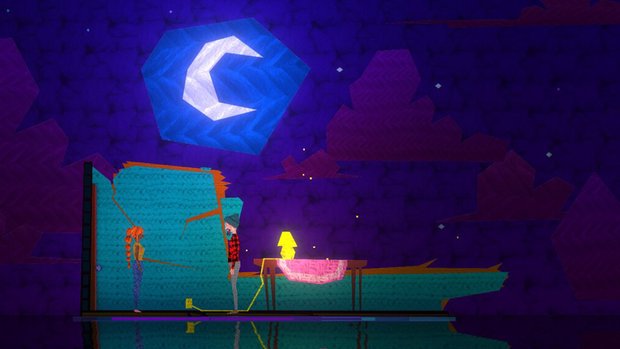
- 0 Comments
Gorgeous hand-crafted side-scroller spins a wildly creative yarn that would have benefited from a little judicious snipping
As Paul Revere & the Raiders once sang, no matter what you do, you’ll never run away from you. Sure, you might be able to avoid your problems for a while, but wherever you try to hide, you’ll find them waiting when you get there…. But hey, that doesn’t mean you shouldn’t try anyway! The developers at Horsefly Games clearly understand the oh-so-human urge to duck out before the bill comes due, and in Hyperdrive Inn they take it to its furthest possible conclusion: namely, that the first and most lucrative application for interdimensional travel would be as a vacation option for people trying to escape their lives. What ensues is a madcap story about loyalty, dedication, and the perils of unchecked escapism, all wrapped up in an ingeniously creative package—albeit one that sometimes stretches itself thin in pursuit of its transdimensional ambition.
In the game’s near-future setting, hyperdrive is a technology that allows people to traverse the endless corridors of spacetime. It’s the discovery of one Mr. Hilbert, a genius inventor who took his creation and used it for a novel purpose: he opened a hotel, the titular Hyperdrive Inn, where there’s always room to spare and each “room” represents but one of a nigh-infinite number of fabulous realities. The business was an immediate smash hit, rendering other vacation spots redundant, while the hyperdrive tech that powered it went on to revolutionize the world.
None of which has done much good for Aino, Mr. Hilbert’s daughter. She’s been estranged from her dad for years now, the result of his workaholic tendencies and unwillingness to confront his issues head-on. After years without contact, though, Aino suddenly gets a letter from her dad, asking her to meet him at the hotel as soon as possible to help prevent a world-shattering catastrophe. Utterly mystified, Aino nonetheless complies, worried that the time has finally come when she’ll have to save her father from himself.
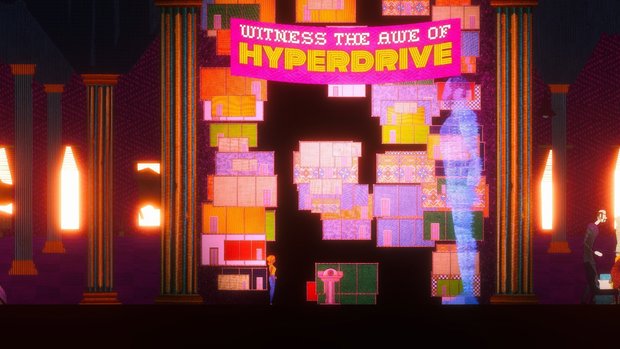
Unexpected as the letter may have been, it’s nothing compared to what’s waiting for Aino when she arrives. First, she learns that the Hyperdrive Inn has been sold to a greedy multinational corporation, DBF Holdings, with her father reduced to serving as general manager. At least, he was; as the new owners tell her, Mr. Hilbert has gone missing somewhere in the ever-shifting depths of his creation, and nobody knows how to track him down. Most concerning of all, the supposedly infinite hotel seems to be getting bigger, and it isn’t slowing down. Something has gone horribly, reality-breakingly wrong with the hyperdrive, and with her father the only one who knows how to fix it, Aino will have to plunge through the strange maze of cascading worlds to find him and avert disaster.
The gamepad-optimized control scheme is plain and straightforward, with the left stick moving Aino in third-person along a two-dimensional plane, and a dedicated interact button to activate hotspots and screen exits. Another button opens your inventory, from which you can select when it’s time to use an item. The dialogue menu, frequent mini-games and combination locks you’ll encounter all operate on the same basic stick-and-button principles. (There’s also a keyboard option, for those who prefer.) All in all it’s a streamlined, user-friendly way of side-scrolling through a setting that’s chaotic at the best of times.
One traverses the hotel via a series of glowing portals, each of which opens onto a different point in the multiverse. After finding the initial portal through which her father vanished, Aino is forced to push blindly onward in hopes that she’ll eventually catch up with him. She has no map, and thus no way to tell where she’ll end up when she steps through a door. Mr. Hilbert has left an oblique trail to help Aino find him, but the clues are often obscure, and the hotel has a habit of changing around them.
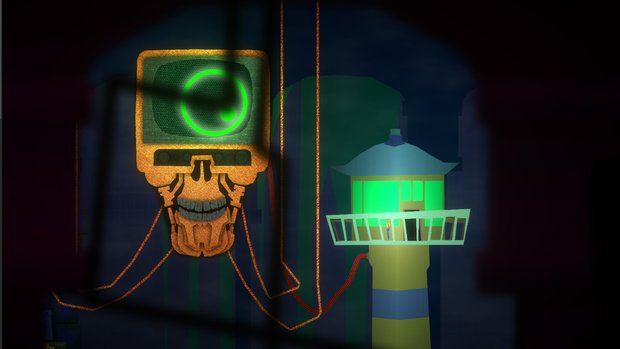
As mentioned, every “room” represents a discrete world within spacetime, each containing an exit door that leads somewhere else in the hotel. The realities you’ll explore are many and varied, but they’re always fabulously weird, ensuring the room you enter is rarely anything like the one you’ve just left. Stepping through a portal on a moving train might drop you into a dark forest with deer as tall as skyscrapers, or a cavernous laundromat overseen by a tyrannical AI, and from there you might just as easily find yourself in the no-man’s-land that separates warring circus troupes as at a dinosaur’s comedy show. Each locale introduces native inhabitants with highly localized cultures, quirks, and problems, which you’ll usually have to help solve in order to find the exit, as well as hotel employees and guests who recur across different areas. Expect to meet talking animals and mythical beasts aplenty, along with robots of all shapes and sizes, as well as the occasional witch, cultist, or giant.
If that sounds like a lot to handle, it surely is, but the game paces itself well and avoids overwhelming you. There’s so much stimulus across the Inn’s multifarious levels that it would be nearly impossible to keep things straight if you had free run of the place. Thankfully, Aino can only explore one hotel room at a time, with the door to the next appearing once she’s accomplished everything in her current location and vanishing after she’s gone through. This lets you focus all your attention on the five to ten screens open to you at a given moment, rather than having to backtrack through the many you’ve already explored.
And many is the operative word, as Hyperdrive Inn goes to great lengths to create the illusion of a near-infinite game world. While progression from start to finish is linear, the hotel nonetheless feels just as vast and full of surprises as it’s supposed to: each room represents a scripted and pre-designed scenario, but the order in which you explore them is randomized, and there are more rooms for the game to place than opportunities for you to see them in a single run. This means not only that each playthrough is unique, but that you’ll have plenty of new characters, locations, and puzzles waiting for you if you choose to replay.
The effect this has on the game’s sense of mystery, adventure and playfulness can’t be overstated. At every turn, it truly feels like anything could happen, and the various scenarios you’ll stumble into are all so unique and strange that the surprises continue whenever you start to think you’ve seen it all. Aino is a perfect protagonist for such a setting, having spent just enough time in her father’s world that she can hit the ground running through each bonkers situation, but with a down-to-earth world-weariness of her own that keeps her laser-focused on returning safely to mundane reality.
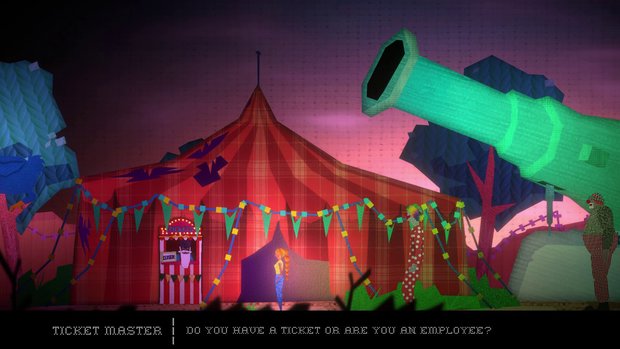
If the game has one flaw, it’s that its maximalist ambition keeps its pieces in motion for much longer than the material supports. It took me around twelve hours to reach the end of the game, but the story it’s telling could have easily taken half that time. As entertaining as it is to see each new scenario the hotel has to offer, most are disconnected in any real sense from the larger narrative about Aino, her father, and the hotel, and serve primarily to offer up new obstacles to overcome as that story slowly progresses. This leads to a sense that the game is dragging its feet, artificially postponing its climax in order to show off more of what’s up its sleeve without providing incentive for the player to care.
Amusing as it can be to find oneself in an intergalactic arcade where barely disguised Star Trek characters argue over their game scores, neither the “Dapper Captain” nor the “Bald Captain” have much to say that relates to what you’re doing. Nonetheless, until you’ve settled a debate by outperforming them at an Asteroids-style minigame, you’re stuck with them. In a shorter game this wouldn’t be a problem, but having taken numerous detours from Aino’s story to mediate feuds, open complex locks, and outfox rogue robots, all while being made to stop now and then for another short and simple, repeatable low-stakes arcade sequence, I eventually found myself checking my metaphorical watch. The game even inflates its own playtime through a quirk of the story that, without getting into spoiler territory, adds basically nothing to the game except to make it go on for longer.
In this way, Hyperdrive Inn seems to want to both have its cake and eat it: the randomized room mechanic promises high replay value, ensuring there’s more of the game than you can see in one playthrough, but the developers want so badly to show off their many wild ideas that they’re reluctant to wrap things up so that you’ll leave wanting more. The game’s puzzle density only compounds the problem, as each room comes with at least one complicated, multi-step puzzle you’ll have to solve to find the way out.
Many of these are solid, if sometimes longer than they need to be, but there’s also an abundance of “find the combination” puzzles that wear out their welcome the more you encounter. Several rely on leaps of logic that still have me scratching my head. The developers are seemingly aware of the problem, too, as previously invisible hints will suddenly appear on clue-bearing items if you take too long to solve the corresponding puzzle. One sequence even plunks a character down next to you whose sole purpose is to explain the secret if you can’t figure it out yourself. Even then, the hints aren’t always very helpful, and I solved a few puzzles through trial and error.
Still, even coming in too long, it’s hard to get tired of Hyperdrive Inn from an aesthetic standpoint. Save for a few hand-drawn close-ups, the brightly colored images are put together using various scanned fabric textures, lending the game a handmade, patched-together-with-love feel. There’s no apparent game-related reason for this (unless it’s a play on “the fabric of reality”), but it’s so pretty to look at that it doesn’t need one. The low-key, jazz-and-Finnish-folk-infused soundtrack is a delight as well, creating an appropriate hotel lobby ambience with the versatility to change and adapt seamlessly to new locales. There’s no voice acting, but I rarely missed it.
Final Verdict
With some screw-tightening and more judicious editing, Hyperdrive Inn might have been an all-timer. Absent that, though, it’s still a fun and deliriously creative game, and that’s no mean thing. Its energy and sense of play is matchless, and the randomization mechanic adds verisimilitude to a setting meant to contain infinity. Its many wondrous sights might have gone over better if they’d been served up more sparingly, but with a game this ambitious, the temptation to show as much off as possible is understandable. Even now, the notion of one day seeing everything I missed appeals to me. With a little time, I may even check back in for another stay.
Hot take
Though it would have benefited from more restraint, Hyperdrive Inn is a wild, multidimensional journey through a kaleidoscope of the possible and the impossible alike, with so much to see that you’ll need multiple playthroughs to experience the fullness of it.
Pros
- Incredibly creative setting truly feels limitless in its potential
- Randomized rooms fit the premise and add to replay value
- Wonderful protagonist is a grounding presence as you navigate the pathways of infinity
- Colorful fabric art is lovely to look at and creates a unique visual aesthetic
Cons
- Abundance of non-essential rooms start to feel like filler
- Overextended playtime results in less replay value
- Some obtuse logic puzzles
Will played Hyperdrive Inn on PC using a review code provided by the game's publisher.






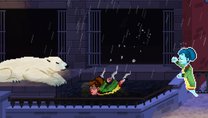




0 Comments
Want to join the discussion? Leave a comment as guest, sign in or register in our forums.
Leave a comment